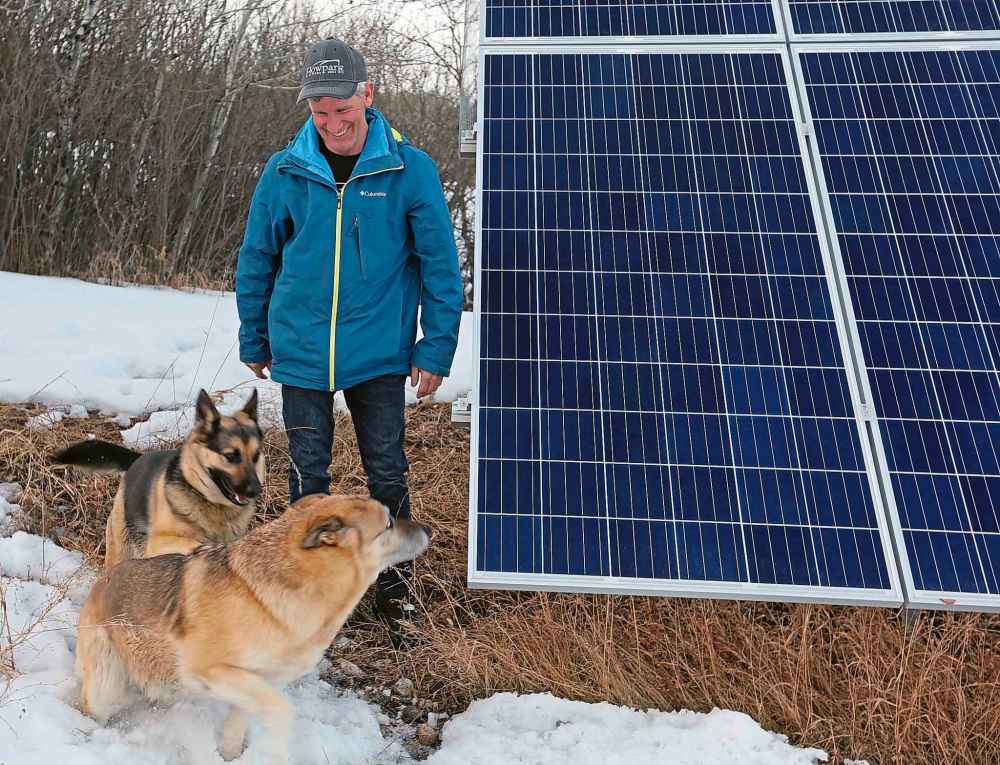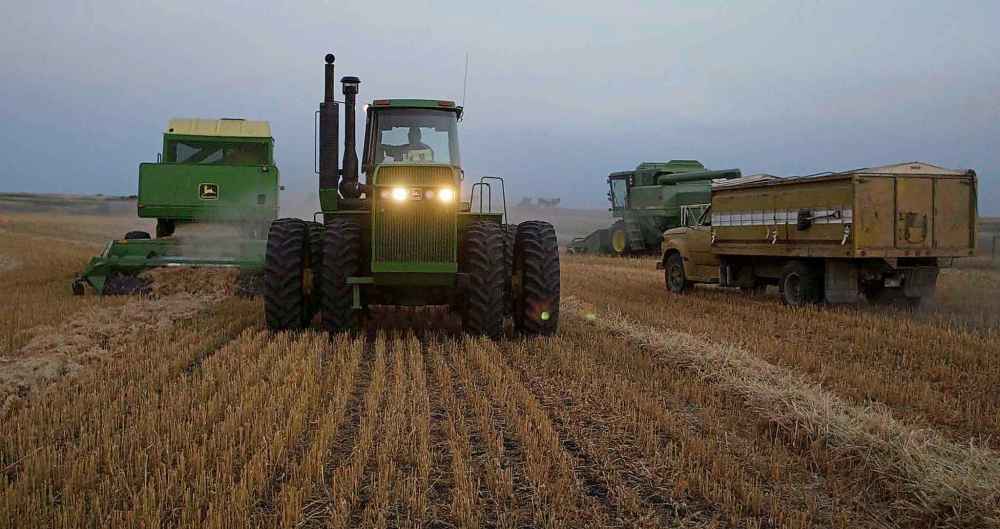Seeding change Increasingly aware of the impact their livelihood has on climate, Canada's farmers are starting to do things differently to lower greenhouse-gas emissions
Read this article for free:
or
Already have an account? Log in here »
To continue reading, please subscribe:
Monthly Digital Subscription
$0 for the first 4 weeks*
- Enjoy unlimited reading on winnipegfreepress.com
- Read the E-Edition, our digital replica newspaper
- Access News Break, our award-winning app
- Play interactive puzzles
*No charge for 4 weeks then price increases to the regular rate of $19.00 plus GST every four weeks. Offer available to new and qualified returning subscribers only. Cancel any time.
Monthly Digital Subscription
$4.75/week*
- Enjoy unlimited reading on winnipegfreepress.com
- Read the E-Edition, our digital replica newspaper
- Access News Break, our award-winning app
- Play interactive puzzles
*Billed as $19 plus GST every four weeks. Cancel any time.
To continue reading, please subscribe:
Add Free Press access to your Brandon Sun subscription for only an additional
$1 for the first 4 weeks*
*Your next subscription payment will increase by $1.00 and you will be charged $16.99 plus GST for four weeks. After four weeks, your payment will increase to $23.99 plus GST every four weeks.
Read unlimited articles for free today:
or
Already have an account? Log in here »
Hey there, time traveller!
This article was published 06/03/2020 (2117 days ago), so information in it may no longer be current.
Ian Grossart inherited his Brandon-area grain and cattle farm from his dad, just as his father and grandfather did before him.
In those four generations of farming, the family has learned a thing or two about extreme weather.
“My great-grandfather got here in 1879 and that was a really nasty winter that year,” Grossart says of the story that has been passed down through the family.
“Every year has its challenges. Last year we went from a drought in the spring, to a lot of excess moisture in the fall. So that’s maybe a way that we’re seeing things change even quicker… from one extreme to another.”
Climate change is expected to have a significant impact on farmers. For example, for the area outside of Brandon where Grossart’s Howpark Farms is located, the growing season is expected to move much later into the year. According to Prairie Climate Centre modelling, Sept. 21, on average, was the first day of frost between 1976 and 2005. By the end of the century — if global carbon emissions continue at status quo levels — it is predicted to be almost a month later, falling in mid- to late-October.
“Every year has its challenges. Last year we went from a drought in the spring, to a lot of excess moisture in the fall. So that’s maybe a way that we’re seeing things change even quicker… from one extreme to another.”
– Brandon-area grain and cattle farmer Ian Grossart
While Grossart finds it difficult — if not impossible — to differentiate between weather events triggered by climate change and regularly irregular weather that’s been around since before his family began farming the land just on the edge of the Brandon Hills, he knows climate change will make things even more unpredictable.
Not at all surprising, unpredictability isn’t something farmers favour.
That is part of the reason Grossart is proud to have changed the way he works. In 2000, he moved to organic farming and now he’s working on implementing the principles of regenerative farming.
He was selected by General Mills, an American multinational food producer, to be a part of their regenerative farming initiative, wherein they’re aiming to convert one million acres of conventional farmland to use regenerative practices by 2030. It’s a part of an effort to lower the company’s carbon emissions.

“They can’t reduce emissions to the extent that they want unless they have farms that are reducing their emissions, as well,” Grossart said.
The definition of what constitutes regenerative farming depends on who you ask. But in its essence, it is a holistic approach to growing the carbon-capture capabilities — and the health — of soil. For General Mills, this means farmers involved in their initiative need to minimize the amount of soil they till, maximize crop diversity and keep a cover crop on their fields all year round.
But regenerative agriculture is just the new “sexy” name for practices that more farmers are already adopting, says University of Manitoba professor of applied soil ecology Mario Tenuta.

“You can come around and package it and give it a name,” said Tenuta. “Regardless of the name, farmers were catching on to these practices.”
But this doesn’t take away from the critical nature the practices hold for decreasing carbon emissions that are generated through agriculture in Canada, he said.
Roughly a third of the province’s emissions come from the agricultural sector. Across Canada, farming accounted for about 60 megatonnes of carbon dioxide equivalent emissions in 2017 or about 8.4 per cent of the country’s total emissions, according to Canada’s 2017 emissions inventory report.
And while cows get all the attention for their methane-producing farts, dirt is nearly as important — at least, from the emissions perspective. The Prairie Climate Centre broke down Canadian emissions and found methane from livestock accounted for 3.5 per cent of the country’s emissions, while soil management was just behind, at 3.2 per cent of emissions.
Farming is particularly notorious for emitting nitrous oxide, one type of greenhouse gas; agriculture accounts for 77 per cent of the country’s total nitrous oxide emissions. It’s 300 times more potent a greenhouse gas than carbon dioxide.
“In Canada, and around the world, use of nitrogen fertilizer is a major source of nitrous oxide. And we are looking at ways to reduce those emissions though our research.”
– University of Manitoba professor of applied soil ecology Mario Tenuta
There are myriad ways nitrous oxide can be released on a farm, including through manure management. However, the U.S. Environmental Protection Agency estimates roughly three-quarters of agricultural nitrous oxide emissions come from soil management, and through synthetic or organic fertilizer application. This is why no- or low-till farming is important to the regenerative agriculture movement.
Tenuta explains that when the land is tilled, bacteria in the soil then gains access to carbon matter that it couldn’t have previously accessed — and that bacteria, in turn, produces the nitrous oxide.
Nitrous oxide emissions also bring attention to how farmers fertilize crops.
“In Canada, and around the world, use of nitrogen fertilizer is a major source of nitrous oxide. And we are looking at ways to reduce those emissions though our research,” Tenuta said.
“And we’re looking at practices we can recommend to farmers that will not cost them very much money, or any money at all.”
Tenuta says he believes the recommendations could result in a 30 to 50 per cent decrease in emissions.
“Farmers are using fertilizer better, I see a trend to that effect,” Tenuta said. “The question becomes, are we moving fast enough? Do we have incentives for the farmers to adopt new technologies, new practices?”

The guidelines for improved fertilizer application are known as the four R’s, and they form the cornerstone of the National Farmers Union recommendations for action on climate change: using the right fertilizer, at the right time, in the right quantities and putting it in the right place.
“Farmers need to lead,” National Farmers Union president Katie Ward said at a presentation of the climate change report in Calgary in late February. “Just like any other industry, we have to do our part, too.”
Ward said she hopes to see farmers electrifying as much fossil-fuel dependent activity as they can, since the electricity grid can be more easily decarbonized.
But just as Tenuta hinted, Ward thinks governments need to provide guidance for a co-ordinated effort to decarbonize agriculture.
“Strong government leadership is needed,” she said.
The Free Press requested an interview with someone working on this topic at Manitoba Agriculture, but received no response.
“I’m always optimistic about agriculture because it was the very first renewable energy industry. Agriculture is built on taking sunlight energy and turning it into sugars, turning it into crops.”
– Mario Tenuta
Premier Brian Pallister did not make any mention of emissions reductions in his mandate letter to Agriculture Minister Blaine Pedersen earlier this week. He did, however, outline the maintenance of wetlands in order to help increase carbon storage and improve water quality.
In fact, the newly announced provincial carbon tax would exempt much activity on farms. This is a political move, more than based on economic grounds, said Chris Ragan, an economics professor at McGill University and the chair of the now-shuttered Ecofiscal Commission, which worked extensively on the public policy case for carbon pricing.
“A lot of carbon pricing, currently, starts off by excluding parts of agriculture — largely for political reasons, not so much for economic reasons,” Ragan said. “Some emissions come from how you till the soil. That’s something that’s pretty hard to address with a carbon price, but some of the emissions come from the diesel tractor, and that’s pretty easy to handle with a carbon price.”
Through all that he’s learned in his research, Tenuta believes that Canadian agriculture can become carbon-neutral, but it requires a great deal of change. He imagines electric farm vehicles, solar-energy infrastructure, even farmers creating their own fertilizers in house using renewable energy.
“I’m always optimistic about agriculture because it was the very first renewable energy industry. Agriculture is built on taking sunlight energy and turning it into sugars, turning it into crops,” Tenuta said. “To me, the thing is, we got caught up in using petroleum fuels.
“There’s a whole bunch of steps going on here. Regenerative agriculture and its component practices are things that farmers are already adopting and moving towards — and that’s part of the picture — but I think it’s just the beginning.”
Grossart said more farmers in his neck of the woods are interested in regenerative practices, but there seems to be a significant distance between that interest and deciding to make sizable changes to their livelihood.
“There’s a lot of pieces that need to fall into place for that to happen,” he said. “But it’s not just about climate and carbon. Soil health is integral to human health.”
sarah.lawrynuik@freepress.mb.ca
History
Updated on Friday, March 6, 2020 7:06 PM CST: Adds photos
Updated on Friday, March 6, 2020 7:47 PM CST: Fixes typo








